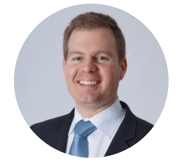Interview with NEMIS investors Schnopp & Füllemann
Michelle Müller, Marketing Assistant at NEMIS:
When did you start investing in startups and why?
Schnopp: There was always an inherent interest in novel innovations in me. Already at an early age, I could familiarize myself with new business ideas and technologies. Personally, I've only really started investing in start-ups in the last few years, and it's primarily through our network that we become aware of new potential business ventures. I focus mainly on segments that interest me personally. These segments are experiencing significant growth, which we are also seeing on the recruiting side. I generally specialize in topics that will change things in the long term and where there is also a demand for it.
Fuellemann: I have been investing all my adult life since the late 80s (Still holding some of my first stocks!) but started investing in private markets about five years ago. As innovation is accelerating and every business can be re-invented to deliver a better customer experience, a stronger value proposition, or a step-change improvement in efficiency, I believe that start-ups have the most significant potential for change. Having worked for large global companies myself, I experienced how they struggle with breakthrough innovation, as the best ideas are often killed upfront to defend the legacy business.
What factors do you pay particular attention to when investing in startups?
Schnopp: I always ask myself whether the business has a chance in the market because, ultimately, there must be a demand. Then it's also about barriers to implementation, such as prominent players in the market, a strong competition, where the chance to establish something new is relatively small. Most importantly however, are the people behind it. If a team does not work together, even the best ideas cannot be implemented.
Fuellemann: Firstly, I try to seize the attractiveness of the opportunity. For me, this means whether the company is truly data-driven and entails a technology-enabled business model on which a sustainable advantage can be built – I shy away from marketing-driven business models. I look at the urgency of the problem being solved, the market attractiveness and time to scale.
Secondly, a winning team truly makes the difference. If a team builds on great founders, they attract talented people willing to buy into the idea.
Furthermore, I put heavy weight on the overall traction with specific deep dives such as financials, customer KPIs, and operational metrics. A convincing and mid-term roadmap should contain a clear focus on short-term success and a clear strategy for the following two to three business development stages. In the end, plans will always change – having no direction and opportunistically running the business is not an option and most likely leads to failure.
Lastly, looking at the profiles of co-investors and their ability to fund a company through multiple development stages is also a compelling factor that I consider in my investment decision.
How heavily do you weigh a start-up's long-term strategic planning compared to an established mid-size/large company?
Fuellemann: In a start-up, I do not expect a very long-term plan that you would typically see in mid- sized or large companies, but a very clear picture of the opportunity is critical. This should address questions like: Which problems are we solving? Why will customers pay for that? How can a defensible advantage be built? How ample is the opportunity? What is the economic model that will make a profitable business?
To predict how a start-up evolves, I take a very close look at its performance track record. I want to see accelerating momentum and assess top-line development, critical operational KPIs, and customer level KPIs such as acquisition costs and lifetime value.
Where do you see the trade-off between long-term strategic planning and short-term flexibility?
Fuellemann: A clear "north star”, which entails a strong vision and deep understanding of the opportunity, is essential to lead a successful venture. This can be broken down by meeting sequential milestones, but the energy of the start-up should go into building short-term impact rather than spending too much time on conceptualizing plans for a distant future. In my entire career, I have never seen a business plan from a start-up materializing precisely as designed in the early days – they all evolve. Being able to show short-term success is crucial when raising investment funds required in the early growth stages of a company.
What makes a good team in a start-up?
Schnopp: On the one hand, each team member needs a straightforward task and brings their specialization and skills. On the other hand, team dynamics evolve around personalities and especially how different personalities act in cooperation. For example, an accountant and a sales manager have different characteristics but must work closely side by side in a start-up. Therefore, empathy and understanding are essential to enable such a diverse group of people to work together. The team spirit is built on this and allows the team to perform in the company.
When you're building teams and recruiting new people for a job, how do you find a balance between skill (plug-and-play for the job description) and personality (attitude & value system fit)?
Schnopp: For example, hiring a new CFO for a company, the focus lies almost always on professional competencies and less on personality traits. From my point of view, the personality part would have to play a more significant role, because at the end of the day, this is the decisive factor whether the recruitment will be a sustainable success or not. It’s clear that you need to have specific skills; we call these "must criteria" - you can't do it without them. And then it's about other criteria that are "nice to have" but which are not crucial for recruitment. The third part is about personality. This comes into play when the must criteria are fulfilled and is ultimately the deciding factor.
Before you invested in NEMIS, what was the main reason that convinced you to do so?
Schnopp: From supplier to investor, we met you for the first time through a recruitment mandate, with our partner Dr. François Martin covering the BioTech / Life Sciences sector. I attended a candidate presentation initially and got to know Arnaud as a very convincing CEO, which has captured my attention at first. What was undoubtedly decisive for the investment is the time-to-market. What also convinced me was the lean approach and the hands-on mentality. The company strategy was firmly focused on the market potential - is there demand, and can we meet it with our USP? Therefore, I have perceived NEMIS as very determined and compelling, and of course, I find the product and its potential impact fascinating. Saving time and money so that SMEs can better afford food safety control is an important issue of our time, which is why I see great potential in NEMIS.
Fuellemann: NEMIS is solving a huge global problem, which not only translates into step-change cost improvements for customers but is also very easy to use and offers a clear value proposition. Furthermore, the business model is based on a platform technology that can be scaled across different verticals such as food, water, animal health, and more. Ultimately, the entrepreneurial and experienced mindset of the core team and co-investors who want to take NEMIS forward has convinced me to invest.
 Michael Schnopp is Managing Partner at Schnopp & Partners, an executive search consultancy. He started his career with a business apprenticeship in the semiconductor industry and later switched to accounting and auditing. After many years of experience in the insurance environment and private banks, he started a degree in business administration and ultimately changed his career path into headhunting.
Michael Schnopp is Managing Partner at Schnopp & Partners, an executive search consultancy. He started his career with a business apprenticeship in the semiconductor industry and later switched to accounting and auditing. After many years of experience in the insurance environment and private banks, he started a degree in business administration and ultimately changed his career path into headhunting.
 Michael Fuellemann is a professional advisor and active investor bringing over 20 years of advisory management experience with Boston Consulting Group (BCG), Bain & Co as well as holding board positions at Schindler Elevators. He studied Business Administration with a focus on financial markets at the University of St. Gallen and kicked off his career in Investment Banking in New York.
Michael Fuellemann is a professional advisor and active investor bringing over 20 years of advisory management experience with Boston Consulting Group (BCG), Bain & Co as well as holding board positions at Schindler Elevators. He studied Business Administration with a focus on financial markets at the University of St. Gallen and kicked off his career in Investment Banking in New York.

